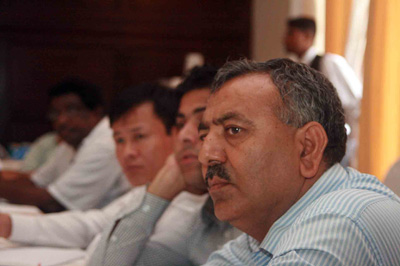Some labour sending countries are getting ‘tough’ with receiving countries (mostly in the Middle East) and insisting on decent conditions for work and also mobility of movement for migrant workers, it was revealed at a discussion in Colombo on Tuesday.
 |
| Pic by J. Weerasekera shows a group of Nepali participants listening to a presentation. |
At a 2-day consultation organised by the the Colombo office of the Solidarity Centre and the Manila-based Migrant Forum for Asia (MFA), William Gois, Regional Coordinator, Migrant Forum for Asia (MFA) explained how the Phillipines’ tough conditions for employing their nationals as domestic workers had led to Saudi Arabia enforcing a ban on Filipina workers (new arrivals and new visas).
“Even before the Phillipines could ‘de-certify’ Saudi Arabia as a receiving country, the Saudis’ issued a ban on new arrivals (domestic workers),” he said.
Just like what is happening in the Philippines, migrant workers groups here have also urged the Sri Lankan Government to protect Sri Lankan domestic workers in other countries who often complain of non-payment of wages, harassment, long working hours, sexual abuse among other concerns.
Last month, Saudi Arabia's Labour Ministry said the kingdom will no longer issue work permits for domestic workers from Indonesia and the Philippines after new hiring guidelines laid out by those nations. The decision, according to an AFP news agency report, was to be effective from July 2.
Earlier Indonesia had said on June 22 it would not send domestic workers to Saudi Arabia until Riyadh signs a deal on migrant worker protection. The moratorium followed the execution days earlier of an Indonesian maid convicted of murdering her Saudi employer's wife, the report said, adding that Indonesian officials complained they were not informed before the execution.
The Philippines has also demanded that the base monthly pay for these workers be doubled to $400.
has also urged Saudi employers to provide the layout of the residence where domestic helpers will be working and information on the families that hire them, and have imposed new rules where workers can only be recruited by countries that have bilateral agreements with the Phillipines and have ratified key UN Conventions connected to human rights and migrant workers. “If we cannot ensure protection of rights for our workers in a particular country, we should not send them to that country,” said one Filipino official present at the Colombo discussion, expressing a view that resonates with what Sri Lankan groups have been urging the authorities here to do in receiving countries.
The Phillipines has set up a permanent Parliamentary working group which is coming up with rules and legislation to ensure their workers are adequately protected overseas and the principle that is followed is that even if one receiving country (like Saudi) dries up as a employment source, there are ample opportunities for jobs in other countries.
Tuesday’s discussion with representatives from migrant worker groups from Sri Lanka, the Phillipines and Nepal centered on the Kafala system (sponsorship of domestic workers), a reference wage rather than a minimum wage structure and a joint campaign to carry forward last month’s passage of the ILO Convention on domestic workers which applies to both domestic workers in their home countries and migrant workers working as domestics.
Mr. Gois said there is a reluctance on the part of sending countries to come together on a common goal fearing that any joint move will antagonise the host country and also because of competition among themselves (sending countries).
He said the Kafala system, where the worker is not allowed to leave the house, is akin to a form of slavery and migrant groups have been urging that it be dismantled or reformed like in Bahrain where some mobility of movement is permited based on some guidelines or consent between the sponsor and worker.
Many issues were raised about problems relating to the contracts of employment where domestic workers are not paid the contracted amount and harassment.
Lanka Jathika Estate Workers Union (LJEWU) General Secretary K.Velayutham, who also leads a 2-year old, affliated migrant workers trade union, made a presentation on the Sri Lankan situation explaining the difficulties faced by workers and also the difficulties in enforcing a contract. |


